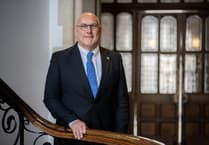THE Health and Social Care Committee is just completing an enquiry into how normal NHS services are going to resume post-pandemic.
Locally, our two hospitals are reporting big drops in the number of Covid patients, with the Royal Surrey even having several days without any at all.
We should all recognise the NHS has just passed one of the most challenging tests in its history.
The scenes we saw in northern Italy or New York did not happen here – and everyone who needed a ventilator or an intensive care bed got one. Huge credit is due to everyone in the NHS for making that possible.
But huge challenges lie ahead.
The need to wear PPE, test patients and observe social distancing means that most hospitals are operating at only 60 per cent of their normal capacity.
The NHS Confederation, which represents NHS organisations, say waiting lists are likely to double to around ten million by September.
Mental-health waiting times will also lengthen with pent-up demand, after a steep decline in referrals at the start of the crisis.
And all these issues have to
be addressed by doctors and nurses who are understandably pretty knackered.
Nonetheless, many unexpected lessons have been learned over the past few months – and if we harness them we can significantly reduce the pressure on staff as well as improve outcomes for patients.
Prior to coronavirus, 70 per cent of GP consultations were face to face. Now it is just 23 per cent. Many doctors say such consultations are no quicker and there will be many situations in which face-to-face consultations remain essential.
But online consultations release space in healthcare facilities and allow doctors who might have reduced their hours or left the workforce to work from home. Some find it much easier to juggle home and work life this way, not least if you have a young family. Could this help keep some of our excellent local GPs?
Online consultations can also be positive for patients, and not just in reducing the spread of infections in surgeries. Many older patients find it challenging to get to an appointment and welcome being able to speak to their doctor from their home.
Another area where I hope we don’t turn back the clock is in our A&Es.
During the pandemic they have to change the way they operate, separating patients with Covid potential from others and putting more experienced clinicians at the ‘front door.’
Dr Katherine Henderson, president of the Royal College of Emergency Medicine, told the select committee that ‘going back to how we used to operate is not an option – patients will die if we do.’
Given the risks to patients and staff of returning to crowded A&E waiting rooms, she describes it as a ‘moral imperative’ to abandon a model which allows patients with non-urgent needs to just turn up.
We may well therefore move permanently to a ‘call before you walk’ model as used in Sweden, Norway and Denmark.
Coronavirus has led to terrible heartache for many families. But if we use the lessons we have learned from it to improve our NHS for the better, there will at least have been a silver lining.
Next week I will consider whether the same is true for the social care system. In the meantime, don’t forget to let me know your views on these issues through my online health survey at www.jeremyhunt.org/news/local-health-priorities





Comments
This article has no comments yet. Be the first to leave a comment.